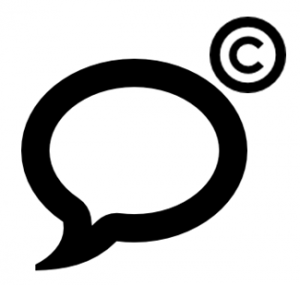 Copyright is regularly held up in public debates as both a barrier to, and a pre-condition of free speech.
Copyright is regularly held up in public debates as both a barrier to, and a pre-condition of free speech.
Given the emotive power of human rights arguments, as well as how readily they are used, it is worth exploring these claims. The answer, to both, is ‘not necessarily’.
Foe?
Taking the Universal Declaration of Human Rights as a starting point, free speech and copyright appear to sit in different places. Article 19 explicitly guarantees Freedom of Expression, while it is Article 27(b) that is usually given as the human rights justification for copyright.
Article 27(b) comes alongside the right in Article 27(a) to participate in cultural life, enjoy the arts, and share in scientific advancement and its benefits. The implication is that Article 27 has dual goals – to ensure the rights both of the community as a whole, and those of creators.
This same idea of dual goals is also visible in the Berne Convention of 1886, which established the international copyright framework. As well as giving rights for creators, it also set out a range of exceptions to these rights that allow the community to use works – books, newspapers, other forms of creativity – in support of free speech in the press, education institutions, and broader public life.
For libraries, these provisions and other exceptions such as lending and copying, are vital to their work of promoting literacy, research and creativity, from villages and schools to the biggest cities or universities.
Nonetheless, these exceptions, both for libraries and more generally, are not universally applied. Copyright need not be opposed to free speech, but when it is applied in an unbalanced way, it can be harmful.
The situation is not necessarily getting better. For example, in Europe, the proposed press publishers’ right – a move that is justified as a means of creating a market for small snippets of articles – risks making it more difficult to bring together and share news.
The justification is the idea that rights are needed in order to create a market for the licensing of such content. The position taken by libraries, up to now, is that such a provision has no place in a balanced copyright system.
Friend?
While it is easy to dismiss this argument as based on purely monetary concerns, there is a counter-argument that makes the case for copyright (and related rights, such as the press publishers’ right) as being at the heart of free expression.
The logic? It is copyright that allows money to be made from creativity. Without it, then there would be no professional expression or creativity. In short, no free expression without copyright.
The argument is initially attractive – and has the advantage of being a model that is familiar. However, as indicated above, the fundamental human right given to artists – to enjoy protection of the moral and material interests of their labour – does not specify how this is to be achieved.
It certainly does not pick out copyright as the way of achieving it, a point made by Farida Shaheed in her 2014 report as UN Rapporteur on Access to Information.
What is true is that copyright has proven, in the past, to be a useful financing mechanism. At least in theory, by turning creative works into tradable ‘goods’, it offers a way of making investments recouping returns over a limited period. It also offers moral rights – attribution, protection against distortion or misappropriation – which may give creators useful reassurance in their work.
How effective copyright is as a means of ensuring that money ends up in the hands of authors and other artists – its original goal – is up for discussion.
While many creators enjoy positive relations with their publishers or record companies, others voice concerns how well they are faring from contracts. Many creators are exploring alternative ways of earning from their creativity. Nonetheless, we are a long way from a world where copyright loses its place as the dominant tool for financing creativity and bringing it to the public in many sectors.
Copyright, therefore, is a tool for realising a human right, rather than an end in itself.
While it has an ongoing role in generating the revenues that allow professional creators to do their jobs, it should not stand in the way of fair uses.
Legal provisions – exceptions and limitations – are necessary to permit works to be used for the purpose of free speech and access to information, where this does not do unreasonable harm to creators. So too are institutions such as libraries which help avoid the market failure that would result from access to knowledge and culture – a necessary pre-condition for informed debate and a healthy society – being dependent on ability to pay.
In the interests of freedom of expression and broader creativity, copyright should be respected where it works. But where it doesn’t, it should be challenged.